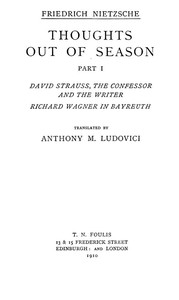Thoughts out of Season, Part I by Friedrich Wilhelm Nietzsche
"Thoughts out of Season, Part I" by Friedrich Wilhelm Nietzsche is a philosophical text written in the late 19th century. This work presents Nietzsche's critiques of contemporary culture and morality, exploring themes such as the consequences of national pride following Germany's victory in the Franco-Prussian War and the nature of genuine culture versus mere cultivation. Central figures in this examination include David Strauss and Richard Wagner, whose works and legacies prompt Nietzsche's
reflections on art, culture, and the future of humanity. At the start of the text, Nietzsche discusses the aftermath of the war, emphasizing the danger of complacency that often follows victory. He warns against the prevailing belief that German culture itself has triumphed, suggesting instead that the military success was due to factors unrelated to genuine cultural achievement. He critiques "culture-Philistinism," the shallow cultural attitudes that he believes threaten to overshadow true artistic and intellectual growth. Nietzsche sets the tone for his polemics against complacency in the face of a flourishing yet insipid culture, using the ideas of Strauss and Wagner as focal points for his arguments. (This is an automatically generated summary.)
Read or download for free
| How to read | Url | Size | |||
|---|---|---|---|---|---|
| Read now! | https://www.gutenberg.org/ebooks/51710.html.images | 400 kB | |||
| EPUB3 (E-readers incl. Send-to-Kindle) | https://www.gutenberg.org/ebooks/51710.epub3.images | 225 kB | |||
| EPUB (older E-readers) | https://www.gutenberg.org/ebooks/51710.epub.images | 231 kB | |||
| EPUB (no images, older E-readers) | https://www.gutenberg.org/ebooks/51710.epub.noimages | 207 kB | |||
| Kindle | https://www.gutenberg.org/ebooks/51710.kf8.images | 321 kB | |||
| older Kindles | https://www.gutenberg.org/ebooks/51710.kindle.images | 292 kB | |||
| Plain Text UTF-8 | https://www.gutenberg.org/ebooks/51710.txt.utf-8 | 375 kB | |||
| Download HTML (zip) | https://www.gutenberg.org/cache/epub/51710/pg51710-h.zip | 208 kB | |||
| There may be more files related to this item. | |||||
Similar Books
About this eBook
| Author | Nietzsche, Friedrich Wilhelm, 1844-1900 |
|---|---|
| Editor | Levy, Oscar, 1867-1946 |
| Translator | Ludovici, Anthony M. (Anthony Mario), 1882-1971 |
| Title |
Thoughts out of Season, Part I David Strauss, the Confessor and the Writer - Richard Wagner in Bayreuth. |
| Note | Reading ease score: 43.6 (College-level). Difficult to read. |
| Note | Wikipedia page about this book: https://en.wikipedia.org/wiki/Untimely_Meditations |
| Credits | Produced by Marc D'Hooghe (Images generously made available by the Hathi Trust.) |
| Language | English |
| LoC Class | B: Philosophy, Psychology, Religion |
| Subject | Wagner, Richard, 1813-1883 |
| Subject | Strauss, David Friedrich, 1808-1874 |
| Category | Text |
| EBook-No. | 51710 |
| Release Date | Apr 9, 2016 |
| Most Recently Updated | Apr 2, 2024 |
| Copyright Status | Public domain in the USA. |
| Downloads | 312 downloads in the last 30 days. |
| Project Gutenberg eBooks are always free! | |


